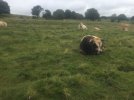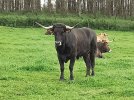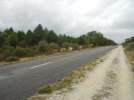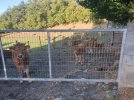ChrisMayou
Member
- Time of past OR future Camino
- del Norte planned for Sept 1, 2024
Are there Spanish* phrases used when walking near cows? In America, you might hear "hey Bessie," or at least I think that's a thing! What soothing, friendly things might this practically city-slicker say while trying not to convey nervousness to the much larger animals? *And, on the Norte, I suppose there are languages besides Spanish that the local farmers might use.






















